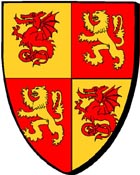
Cymru - Bro Gembre
Wales - Pays de Galles

***
Carmarthenshire
Encyclopédie Marikavel-Jean-Claude-EVEN/Encyclopaedia/Enciclopedia/Enzyklopädie/egkuklopaideia
| Noms de lieux | Noms de personnes |

Cymru - Bro Gembre Wales - Pays de Galles |
blason ou logo en attente | 
*** Carmarthenshire |
|
Pumpsaint Luentinum |
| page ouverte le 02 février 2005 |
|
forum de discussion
* forum du site Marikavel : Academia Celtica |
dernière mise à jour 06/11/2009 13:19:04 |
![]()
|
Définition : commune du Pays de Galles, en Carmarthenshire; Autrefois le fort romain LUENTINUM. Au confluent des rivières Afon Twrch et Afon Cothi. |
|
![]()
|
Extrait de la carte Ordnance Survey : Map of Roman Britain. Pumpsaint est située tout près de Dolaucothi ( = courbes de la rivière Cothi), soulignée de rouge, au nord-est de Carmarthen.. |
![]()
|
Histoire : Wales Tourist Board, p 58 : "The hill above this little Cothi-side villageof 'Five Saints' was taken apart by the romans in their frantic search for gold (although they did build a bathhouse near the present Cothi road bridge and a fort). The toiloing legion left, eventually the National trust arrived; the Roman gold-mine is now a picnic site and stretches along the steeply-wooded river can be wandered at will. Four miles south are the ruins of 12th-century Talley Abbey, founded by the Lord Rhys". |
![]()
|
Étymologies : a) Luentinum : Rivet & Smith, p 400 : - Ptolémée, II,3,12 : Louentinon (= LUENTINUM); variante Louention (= LUENTIUM). "The root seems to be *lou-*loue- 'to wash' (Pokorny 692), with which arc connected Latin lavo, diluvium, etc., Gaulish *lautro- (see LAVATRIS), Welsh lludw ' rain ', etc. For the formation one might compare the Italian river CIuentus (root *clou- of similar meaning : see CLOTA) with *-ent- suffix as in Derventio, plus *-in(a) perhaps as in Lindinis, Sabrina. The reference might be literally to washing (if the identification below is right, to the washing of gold-bearing ores); or, if a comparison is again made with Clota, Luentinum might be 'place on the *Luentina river' (the -ina suffix of Lindinis and Sabrina being analogous), in which event 'wash' has extended to 'flow' or incorporates (as Clota may do) a divine name". IDENTIFICATION. Probably the roman fort and gold-mining settlement at Pumpsaint, Carmarthenshire (SN 6640), at the confluence of the avon Twrch with the afon cothi. The suggestion that the reference might be to gold-washing was made to us by Mr G.C. Boon. b) Pumpsaint : du gallois pump = cinq + saints : Les Cinq Saints. (recherche de
la raison étymologique en cours). |
![]()
|
Sources : - Wales Tourist Board : South Wales. 1976. - A.L.F Rivet & Colin Smith : The Place-names of Roman Britain. B.T Batsford Ltd. London. 1982. Envois de : |
![]()
|
Liens électroniques des sites Internet traitant de Pumpsaint / Luentinum : * lien communal officiel : http://www.ukvillages.co.uk/ukvillages.nsf/villages/pumpsaint-carmarthenshire http://www.aboutbritain.com/towns/pumpsaint.asp http://www.mindat.org/loc-5224.html http://en.wikipedia.org/wiki/Pumsaint http://www.francisfrith.com/search/wales/dyfed/pumpsaint/pumpsaint.htm * forum du site Marikavel : Academia Celtica hast buan, ma mignonig go fast, my little friend |
![]()